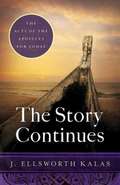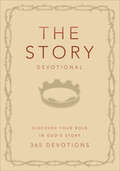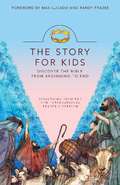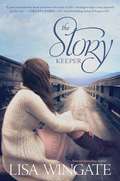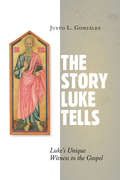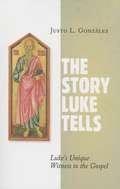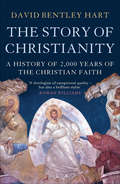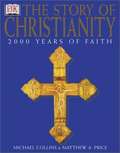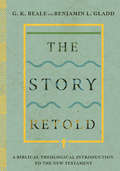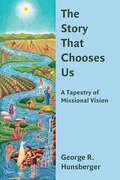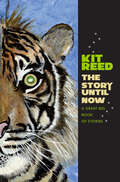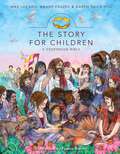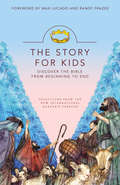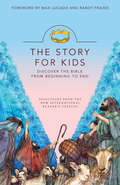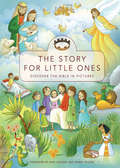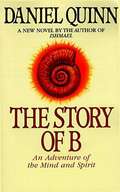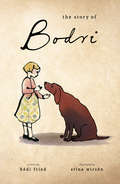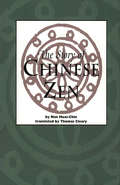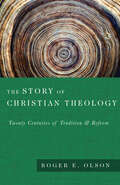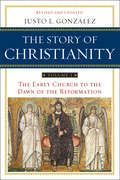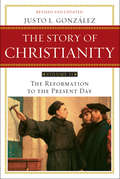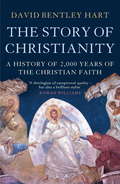- Table View
- List View
The Story Continues: The Acts of the Apostles for Today
by J. Ellsworth KalasAt the very beginning of our faith, the Christian population numbered afew thousand, measuring only one percent of the world population. Today asingle mega-church can boast a comparable number, and together,Christians now number more than two billion people. It all beganwith this little body of believers who knew a secret that needed to beshared. How did they do it? And what can we learn from them?Joinbest-selling author and beloved pastor, J. Ellsworth Kalas, as heexplores the book of Acts to uncover the ministry motivations of thefirst followers—ordinary people who accomplished the extraordinary andwho can serve as a guide for today’s believers to carry on. Because thework is not done. The story continues…This book contains a discussion guide.
The Story Devotional: Discover Your Role in God's Story
by ZondervanLike The Story, The Story Devotional will guide readers through the overarching narrative of the Bible in 365 days. Combining Scripture with bite-sized reflections and a daily takeaway, readers will be able to work their way through God's epic Story and focus on His plan for their lives. Following the same chronological organization as The Story, readers will see their lives in a whole new light, with purpose as part of God's eternal story. Using the takeaway message at the end of each devotion, readers can apply the teachings of the Bible to their daily life. This book can be used in conjunction with The Story or as a stand alone devotional.This is the first devotional product in The Story line.Trim Size: 5 x 7
The Story For Kids: Discover The Bible From Beginning To End
by Max Lucado Randy Frazee Zondervan Bibles StaffAdventure. Humor. Drama. Now kids can discover God's great love story in a new format! As you read, you will uncover the "big picture. " Kids will find out that God's story is not just a collection of random adventures--it's a complete story that tells about God's great love for his people. Using the New International Reader's Version (NIrV) of the Bible, The Story for Kids reads like a novel. Events, characters, and teachings are arranged in order to show God's unfolding story. Kids will love reading the greatest story ever told! The Story for Kids is a unique edition of the New International Reader's Version (NIrV) of the Bible done in story format to parallel the adult and teen editions of the church-wide campaign, The Story.
The Story Keeper (A Carolina Heirlooms Novel #2)
by Lisa WingateAccording to Gee Gee Rosell, "Moving to New York City doesn't break the strong ties to her Appalachian heritage the way Jen Gibbs hopes it will. She finds her ancestors beckoning her when an anonymous manuscript mysteriously appears on her desk. The Story Keeper mixes soul-deep darkness with the possibility of redemption..."
The Story Luke Tells: Luke's Unique Witness to the Gospel
by Justo L. GonzalezAmong New Testament writers, who is the best historian? Without a doubt, says Justo Gonzalez, it’s Luke. Concerned about the particulars of people and events, Luke also gives readers the big picture, positioning the stories of Jesus not just in the history of Israel but in the history of humankind. Luke uniquely tells us the grand story of salvation -- then and now.Gonzalez skillfully highlights key themes in Luke’s storytelling, including his strong emphasis on God’s “great reversals,” his keen interest in shared meals and their intimate connection to worship and communion, and his passionate underscoring of both the saving work of Christ and the indwelling power of the Holy Spirit. Writing in a conversational style, Gonzalez draws readers into Luke’s story with fresh overviews and rich details, showing how Luke invites us to continue his gospel witness today.Watch a 2014 interview with the author of this book here:
The Story Luke Tells: Luke's Unique Witness to the Gospel
by Justo L. GonzálezAmong New Testament writers, who is the best historian? Without a doubt, says Justo Gonzalez, it's Luke. Concerned about the particulars of people and events, Luke also gives readers the big picture, positioning the stories of Jesus not just in the history of Israel but in the history of humankind. Luke uniquely tells us the grand story of salvation -- then and now. Gonzalez skillfully highlights key themes in Luke's storytelling, including his strong emphasis on God's great reversals, his keen interest in shared meals and their intimate connection to worship and communion, and his passionate underscoring of both the saving work of Christ and the indwelling power of the Holy Spirit. Writing in a conversational style, Gonzalez draws readers into Luke's story with fresh overviews and rich details, showing how Luke invites us to continue his gospel witness today.
The Story Of A Whim (Grace Livingston Hill #68)
by Grace Livingston Hill"A passing fancy--or a life-changing event? What would he do with Sunday-school books? The old organ that arrived with his belongings would provide some music for his lonely life, but the thought of him starting a Sunday school was laughable. Still, he would write to his benefactor and thank her. It was the least he could do. Better not tell her he was a young man, though. Why embarrass her? If she were an example of Christianity, maybe he should even take a look at that Bible she sent. What could it hurt?" [From the front dust jacket flap:] It began as a whim--a sudden urge to help an unknown girl named Christie. Hazel Winship and her college friends saw the worn furniture on the train platform and decided to do a little sprucing-up before the furniture was shipped. Adding an old organ, a Bible, and some Sunday school materials to the boxes, they sent the shipment on its way, sure they had helped some poor missionary girl in Florida. But Christie Bailey was anything but a poor missionary girl. He was a struggling citrus farmer--a wild young man who had no intention of starting a Sunday school! Many changes would come to his life as a result of Hazel's whim, including some serious problems. How could he tell her he was not a girl--especially after they began corresponding? He had found Christ because of Hazel, but now he was trapped in a deception he could not untangle! #1. Where Two Ways Met, #2. Bright Arrows, #3 A Girl to Come Home To, #13 In Tune with Wedding Bells, #15 Marigold, #18 brentwood, #24 by way of the silverthorns, #26. The Seventh Hour, #30 Matched Pearls, 33 Happiness Hill, #38 Spice Box, #41 blue ruin, #42 A New Name, 47 The Street of the City, #50 The Finding of Jasper Holt, #55 Ladybird, #61 Mystery Flowers, #66 The Girl From Montana, #68 The Story of a Whim, #70 in the way, #71 exit Betty, #72. The White Lady, #73 Not Under the Law, #74 Lo Michael, #76 The City of Fire, #77. The Ransom, #84 Cloudy Jewel, #93 Katharine’s yesterday, and #95 Mary Arden, with many more on the way.
The Story Of Christianity
by David Bentley HartThe story of Christianity is an immeasurably fascinating one. A faith that began in Roman occupied Palestine, as a small and fugitive faction within Judaism, grew, thrived and finally "conquered" the empire that had sought to exterminate it. Then, over many centuries and in many lands, it became the vital source from which new civilizations sprang. At times, its geographical range expanded mightily, at others contracted perilously. At times, the church proved heroically true to its deepest moral principles; at others, inexcusably traitorous to them. But, by the beginning of the 21st century, this faith that began in such fragility, and that became so powerful--even though its temporal power has now receded in its historic homelands--is the most widespread and diverse of all religions. Christianity is rapidly taking root in cultures very different from those in which it was born and in which it once flourished, and is assuming configurations that could not have been anticipated a century ago. In The Story of Christianity, the distinguished theologian David Bentley Hart provides a broad picture of Christian history. Presented in 50 short chapters--each focusing on a critical facet of Christian history or theology, and each amplified by timelines, quotations, and color images--his magisterial account does full justice to the range of Christian tradition, belief and practice--Eastern Orthodox, Roman Catholic, Anglican, Presbyterian, Evangelical, Coptic, Chaldean, Ethiopian Orthodox, Armenian Orthodox, Malankaran, to name but a few of the many possibilities. From the persecutions of the early church to the papal-imperial conflicts of the Middle Ages, from the religious wars of 16th and 17th-century Europe to the challenges of science and secularism in the modern era, and from the ancient Christian communities of Africa and Asia to the "house churches" of contemporary China, The Story of Christianity triumphantly captures the heterogeneous richness of Christian history.
The Story Of Christianity
by Michael Collins Matthew A. PriceCo-written by a Roman Catholic priest and a Protestant minister, this balanced, richly illustrated history of the Christian religion traces the two-thousand-year development of the world’s largest organized religion, from its Old Testament roots to the present day.
The Story Retold: A Biblical-Theological Introduction to the New Testament
by G. K. Beale Benjamin L. GladdisThe Story Retold
The Story That Chooses Us: A Tapestry of Missional Vision (The Gospel and Our Culture Series (GOCS))
by George R. HunsbergerOver the course of several decades, missiologist George Hunsberger has written numerous essays on crucial themes for the church’s recovery of its missional identity and practice. The Story That Chooses Us brings these essays together for the first time.The book as a whole presents a composite sense of the missional identity and faithful witness to which the church is called in contemporary Western society. Hunsberger engages with well-known missiologist Lesslie Newbigin throughout his work as he carefully discerns biblical and theological roots for a contemporary vision of missional theology. The recurring themes in Hunsberger’s essays provide both theological mooring and practical guidance for churches following Christ on the missional path.
The Story Until Now: A Great Big Book of Stories
by Kit ReedThe best stories from a master of speculative fiction Called "one of our brightest cultural commentators" by Publishers Weekly, Kit Reed draws from life—with a difference. This new collection brings together thirty-four of her strong, original stories, from early classics like "The Wait" and "Winter" to six never-before-collected short stories, including "The Legend of Troop 13" and "Wherein We Enter the Museum." An early favorite, "Automatic Tiger," is the first in a series of Reed's stories about animals. There's a monkey who grinds out bestsellers with the help of a "creative writing" app. Her uncanny black dog can enter a crowded room and sit down at the feet of the next man to die. Her characters confront war in various arenas: mother/daughter battles, the war of the sexes, the struggles of men scarred by war. Kit Reed's self-described "transgenred" fiction is confirmation of an "extraordinary talent" (The Financial Times). The range and complexity of her work speaks for itself in The Story Until Now.
The Story for Children, a Storybook Bible (The Story)
by Max Lucado Randy Frazee Karen Davis HillBestselling author Max Lucado presents The Story for Children storybook Bible, written with Randy Frazee as part of The Story campaign. Geared for children 4-7, this storybook Bible includes over 60 stories that allow readers to discover that God’s story is not just a collection of random adventures—it’s a complete story that tells about God’s great love for his people.
The Story for Kids, NIrV
by ZondervanAdventure. Humor. Drama. Now kids can discover God’s great love story in a new format! As you read, you will uncover the “big picture.” You’ll find out that God’s story is not just a collection of random adventures—it’s a complete story that tells about God’s great love for his people. Using the New International Reader’s Version (NIrV) of the Bible, The Story for Kids reads like a novel. Events, characters, and teachings are arranged in order to show God’s unfolding story. This revised edition has updated transitions and all-new artwork. You’ll love reading the greatest story ever told!
The Story for Kids: Discover the Bible from Beginning to End (The Story)
by Max Lucado and Randy Frazee Zonderkidz"Adventure. Humor. Drama. Now kids can discover God’s great love story in a new format! As you read, you will uncover the “big picture.” You’ll find out that God’s story is not just a collection of random adventures—it’s a complete story that tells about God’s great love for his people. Using the New International Reader’s Version, The Story for Kids reads like a novel. Events, characters, and teachings are arranged in order to show God’s unfolding story. With fun art and thought-provoking questions, you’ll love reading the greatest story ever told!"
The Story for Little Ones
by ZondervanNow that they know their ABCs and 1-2-3s, are your children ready to start reading? The Picture That! Bible Storybook will help kids ages 6 and under feel like reading is easy-and fun too! This picture reader sprinkles over 90 full-color picture icons into more than 65 Bible stories. Noah and the ark full of animals, David and the giant, Jesus calming the storm, the angel at the empty tomb-these are just a few of the Old and New Testament stories your kids will be reading-yes reading! The icons will encourage them to jump from picture to picture and then try to read some words in between. To help keep things interesting, various layouts with full-page illustrations and some larger picture icons fill the pages of the Picture That! Bible Storybook-readers will be excited to see what's coming next! And at the end of each story, a simple, one-line lesson helps children remember what it teaches and offers to apply what they learn. Based on the New International Reader's version (the Bible translation for beginning readers), the Picture That! Bible Storybook is reading at its easiest. This unique, creative book is bound to become a favorite with children and parents alike. Written by best-selling author Tracy Harrast.
The Story of B (Ishmael Series #2)
by Daniel QuinnThe Story of B combines Daniel Quinn's provocative and visionary ideas with a masterfully plotted story of adventure and suspense in this stunning, resonant novel that is sure to stay with readers long after they have finished the last page. Father Jared Osborne--bound by a centuries-old mandate held by his order to know before all others that the Antichrist is among us--is sent to Europe on a mission to find a peripatetic preacher whose radical message is attracting a growing circle of followers. The target of Osborne's investigation is an American known only as B. He isn't teaching New Age platitudes or building a fanatical following; instead, he is quietly uncovering the hidden history of our planet, redefining the fall of man, and retracing a path of human spirituality that extends millions of years into the past. From the beginning, Fr. Osborne is stunned, outraged, and awed by the simplicity and profundity of B's teachings. Is B merely a heretic--or is he the Antichrist sent to seduce humanity not with wickedness, but with ideas more alluring than those of traditional religion? With surprising twists and fascinating characters, The Story of B answers this question as it sends readers on an intellectual journey that will forever change the way they view spirituality, human history, and, indeed, the state of our present world.From the Trade Paperback edition.
The Story of Bodri
by Hédi FriedHédi spends her days playing with her dog Bodri in the park, but her quiet world starts to crumble the day she hears Adolf Hitler on the radio. Germany&’s leader hates her and her family, just because they are Jewish. And Hitler doesn&’t even know them—it doesn&’t make any sense. Soon Nazi Germany invades Hédi&’s country, and her life changes forever.Inspired by the author&’s experiences, this book is a thoughtful introduction to the Holocaust for young readers. Strikingly honest prose and illustrations share an unforgettable story about a faithful dog, a family in danger, and the power of hope in unimaginable circumstances.
The Story of Chinese Zen
by Thomas Cleary Nan Huai-ChinThe development of Zen in China is really the story of the flourishing of Chinese philosophy, arts and literature beginning as far back as the Han Dynasty and earlier. Master Nan Huai-Chin offers an engaging chronicle of both in this groundbreaking work.
The Story of Chinese Zen
by Thomas Cleary Nan Huai-ChinThe development of Zen in China is really the story of the flourishing of Chinese philosophy, arts and literature beginning as far back as the Han Dynasty and earlier. Master Nan Huai-Chin offers an engaging chronicle of both in this groundbreaking work.
The Story of Christian Theology: Twenty Centuries of Tradition Reform
by Roger E. OlsonVoted a 2000 Book of the Year by Christianity TodayWinner of a year 2000 ECPA Gold Medallion Award History is made up of stories--narratives that recount the events, movements, ideas and lives that have shaped religions and nations. Theologian Roger Olson believes that the history of Christian theology should be told as such a story, one replete with thick plots, exciting twists, interesting people and fascinating ideas. In this panoramic work of historical theology Olson vividly recounts the deeds and words of the cultists and apostolic fathers of the second century, the clash between the theological schools of Alexandria and Antioch, the epochal division between East and West, the revolutionary advent of the Reformation and much more, right on up to the dazzling, sometimes dismaying fallout that has continued to shake Christians through the twentieth century. Through it all Olson detects and traces a common thread: a concern for salvation--God's redemptive activity in forgiving and transforming sinful human beings. Evenhanded, refreshingly readable, impressive in its breadth and depth, The Story of Christian Theology is poised to become a standard historical theology text.
The Story of Christianity, Volume I: The Early Church to the Dawn of the Reformation (The Story of Christianity #1)
by Justo L. GonzálezIn this fully revised and updated edition, the lauded church historian Justo González tells the story of Christianity from its fragile infancy to its pervasive dominance at the dawn of the Protestant Reformation. The Story of Christianity, volume 1, relates the dramatic events, the colorful characters, and the revolutionary ideas that shaped the first fifteen centuries of the church's life and thought.<P> From Jesus's faithful apostles to the early reformist John Wycliffe, González skillfully weaves details from the lives of prominent figures tracing core theological issues and developments within the various traditions of the church. The Story of Christianity demonstrates at each point what new challenges and opportunities faced the church and how Christians struggled with the various options open to them, thereby shaping the future direction of the church.<P> This new edition of The Story of Christianity incorporates recent archaeological discoveries to give us a better view of the early Christian communities. Among these are advances in the recovery of Gnostic texts that have revealed a richer diversity of "Christianities" in the first century. González also includes important research done in the past twenty-five years revealing the significant role of women throughout the history of the church. <P> With lively storytelling incorporating the latest research, The Story of Christianity provides a fascinating introduction to the panoramic history of Christianity.
The Story of Christianity, Volume II: The Reformation to the Present Day (The Story of Christianity #2)
by Justo L. GonzálezBeginning with the Protestant Reformation of the sixteenth century, this fully revised and updated second volume of The Story of Christianity continues the marvelous history of the world's largest religion. Award-winning historian Justo Gonzalez bring to life the people, dramatic events, and theological debates that have shaped Protestantism, Catholicism, and Orthodoxy. From the monk Martin Luther, who dared to stand up to a corrupt pope, to the surprising spread and growing vitality of today's church in Africa, Asia, and South America, The Story of Christianity offers a complete and up-to-date retelling of this amazing history.<P> With new information on the important contributions of women to church history as well as the latest information on Christianity in developing countries, Gonzalez's richly textured study discusses the changes and directions of the church up to the twenty-first century. The Story of Christianity covers such recent occurrences as the fall of the Soviet Union and the return of the Russian Orthodox Church; feminist, Africa-American, and Third-World theologies; the scandals and controversies facing the reign of Pope Benedict XVI; interfaith dialogue; and the movement toward unity of all Christian churches. This revised and updated edition of The Story of Christianity concludes with a thoughtful look at the major issues and debates facing Christianity today.
The Story of Christianity: An Illustrated History Of 2000 Years Of The Christian Faith
by David Bentley HartIn The Story of Christianity, acclaimed theologian David Bentley Hart provides a sweeping and informative portrait of a faith that has shaped the western world and beyond for over 2,000 years. From the persecutions of the early church to the papal-imperial conflicts of the Middle Ages, from the religious wars of 16th- and 17th-century Europe to the challenges of science and secularism in the modern era, and from the ancient Christian communities of Africa and Asia to the 'house churches' of contemporary China, The Story of Christianity triumphantly captures the complexity and diversity of Christian history.
The Story of Christianity: An Illustrated History Of 2000 Years Of The Christian Faith
by David Bentley HartIn The Story of Christianity, acclaimed theologian David Bentley Hart provides a sweeping and informative portrait of a faith that has shaped the western world and beyond for over 2,000 years. From the persecutions of the early church to the papal-imperial conflicts of the Middle Ages, from the religious wars of 16th- and 17th-century Europe to the challenges of science and secularism in the modern era, and from the ancient Christian communities of Africa and Asia to the 'house churches' of contemporary China, The Story of Christianity triumphantly captures the complexity and diversity of Christian history.
